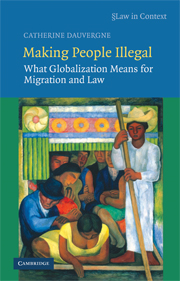Book contents
- Frontmatter
- Contents
- Acknowledgments
- Publication acknowledgments
- 1 Introduction
- 2 On being illegal
- 3 Migration in the globalization script
- 4 Making asylum illegal
- 5 Trafficking in hegemony
- 6 The less brave new world
- 7 Citizenship unhinged
- 8 Myths and Giants: The influence of the European Union and the United States
- 9 Sovereignty and the rule of law in global times
- Bibliography
- Index
- The Law in Context Series
- References
9 - Sovereignty and the rule of law in global times
Published online by Cambridge University Press: 05 June 2012
- Frontmatter
- Contents
- Acknowledgments
- Publication acknowledgments
- 1 Introduction
- 2 On being illegal
- 3 Migration in the globalization script
- 4 Making asylum illegal
- 5 Trafficking in hegemony
- 6 The less brave new world
- 7 Citizenship unhinged
- 8 Myths and Giants: The influence of the European Union and the United States
- 9 Sovereignty and the rule of law in global times
- Bibliography
- Index
- The Law in Context Series
- References
Summary
In the twenty years since Joseph Carens wrote that birth in a prosperous state is the modern equivalent of feudal privilege, his statement has become truer than ever as it travels through time to the cusp of a postmodern world. This truth comes from the shifting nature of sovereignty under the pressures of globalization, and from the resulting transformation in migration laws that undercuts the individual equality of liberal legalism with a rigid hierarchy of entitlement. This chapter completes my argument about globalization and illegal migration by analyzing these shifts in three concluding movements. The first of these is to look at the picture of sovereignty that emerges in each of the core sampling chapters and to develop from this an analysis of the prospects for migration law reform. The second concluding movement is to consider what the implications of this transformed sovereignty are for the rule of law. The final movement of the chapter is to consider what migration law reveals about the place of law, more broadly, in the narrative of globalization.
Migrating sovereignty
The case that migration law is being transformed into the last bastion of sovereignty is made out in a straightforward way. There is evidence of this transformation in each of the core samples, as well as in the narratives of globalization reviewed in Chapter 3.
- Type
- Chapter
- Information
- Making People IllegalWhat Globalization Means for Migration and Law, pp. 169 - 190Publisher: Cambridge University PressPrint publication year: 2008



